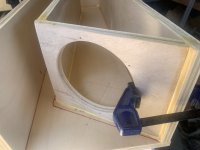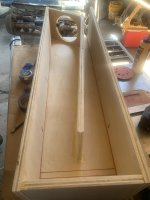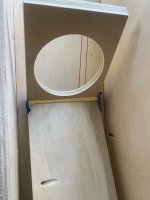DIY is what i mean when i saidIt's not trial and error, but it's engineering knowledge. The point is that it's expensive to know the fatigue curve for the material and for sure companies may evaluate them, DIY is a different history and it's more trial and error.
the word People do not refer to :Audio Companies, Audio Manufacturers, Audio Enterprises ,R&D Dept or the NASA Acoustics Labs. 😎maxolini said:
As looks like by trial and error people find drivers that can survive a high compression enclosure
People means " We The People"
Humans that do not have the means in either money or
equipment such as
Anechoic Chambers to test
Rode and Schwartz scopes
Earthworks M30 mics
and mainframe supercomputer to do Finite Element Analysis
and AI Engine to sim and test thousands of virtual models
Cheers 🍻
That is what she said !! 🤣When it comes to SPL, bigger is usually better..
( could not resist ) 😆
After reading the EV TL papers, drawing sketches and cost projections while bouncing along in trucks on tour ~1977-8, decided to build horn bass and low mid enclosures- half the drivers and amps was more appropriate for my budget, and I'd been building horns for years during the "dark ages" already.In 2016 I wrote an e-mail do Mr. Don Keele Jr. about the EV T18 project and other stuffs and he replied to me:
"I’m definitely in favor of multi-driver vented boxes over horn-loaded system. Attached is a paper I wrote back in the dark-ages of 1976 when I was at EV. It compares several systems one-of which is the Sentry IV B cabinet"
By the mid-1980s had converted to bass reflex for low frequency output density.
Art
@BP1Fanatic
Group delay has entered the chat😝 and the second resonance sounds funny(in the 6th order stuff??? )
All I listen to is Hip Hop. Delayed bass is probably in 95% of Hip Hop music. The Roland TR-808 drum machine has a decay knob that allows you to "drag the bass." When you hear or see people say 808 bass, that's DELAYED bass.
The 808 is noted for its powerful bass drum sound, built from an oscillator, and voltage-controlled. The bass drum control allows users to lengthen the sound, creating uniquely low frequencies that flatten slightly over time, possibly not by design. The New Yorker described the bass drum as the 808's defining feature.
The key to the 808’s popularity is the kick, whose decay can be extended out to ridiculously long lengths. This results in the famous boom, a sub-bass explosion that can felt as much as heard. This boom has been exploited by producers for decades, underpinning standard kicks for extra oomph and even being sampled and used as a bassline.
After reading the EV TL papers, drawing sketches and cost projections while bouncing along in trucks on tour ~1977-8, decided to build horn bass and low mid enclosures- half the drivers and amps was more appropriate for my budget, and I'd been building horns for years during the "dark ages" already.
By the mid-1980s had converted to bass reflex for low frequency output density.
Art
I remember building my 1st BP4 enclosure in 1990. It was a pair of Pyramid Super Pro 1295's for a 1981 Honda Civic 4 Door Sedan. I couldn't believe the smooth distortion free bass that came out of that enclosure...that was improper tuned (the math said 80hz, but I tuned it to 45hz cuz 80hz didn't seem logical in my brain) and the ports were too small (3" diameter) so I couldn't turn it up without port noise. Thank 9od for Linearteam and David McBean for making the world a better place!
I've been addicted to that BP sound ever since.
Because I was specifically making the point that some additional limitations were probably necessary for the general premise of the thread. I was demonstrating extremes, not saying that all bandpasses were bad or that those two were the only possible things. As I stated previously, it's all on a continuum and there are too many options to demonstrate them all.Why not post a non-exaggerated audiophile BP enclosure for a fair comparison to the BR enclosure?
One of the better sound quality cars I heard in my IASCA judging days was a bandpass.
Is that the same thing? Or are you suggesting that two ‘out of phase’ pressure/velocity Sources being added to any existing music is somehow adding to the experience or enhancing it further ? The sloppy speaker duct/resonator is a good thing ?All I listen to is Hip Hop. Delayed bass is probably in 95% of Hip Hop music. The Roland TR-808 drum machine has a decay knob that allows you to "drag the bass." When you hear or see people say 808 bass, that's DELAYED bass.
The 808 is noted for its powerful bass drum sound, built from an oscillator, and voltage-controlled. The bass drum control allows users to lengthen the sound, creating uniquely low frequencies that flatten slightly over time, possibly not by design. The New Yorker described the bass drum as the 808's defining feature.
The key to the 808’s popularity is the kick, whose decay can be extended out to ridiculously long lengths. This results in the famous boom, a sub-bass explosion that can felt as much as heard. This boom has been exploited by producers for decades, underpinning standard kicks for extra oomph and even being sampled and used as a bassline.
View attachment 1354538
So the ‘6th order vented’ isn’t helping the drum in hip hop or anything for that matter, I guess? It always sucks
My 6th order sounds great for Hip Hop and movies.
It's been going strong since 2012.


It's been going strong since 2012.
But that’s a TL with the driver in the open end. You’re not using the bandwidth near or above when the second resonance and bad stuff beGins?
Is it like breathing in while talking 🤣 🤣 🤣 🤣 🤣 🤣Nothing sounds good out of phase.
No it's not a good thing.
Age confirms that it is good. Like wine, if it is not at least 20 years old it must be crappy.My 6th order sounds great for Hip Hop and movies.
It's been going strong since 2012.
Love these comments! TL, sealed box, Bass reflex, open baffle, who cares. Age is the determining factor. I am listening on my pair of LS3/5a on the desk and it is old. Very old and sounds better every day while sipping on my bottle of wine recovered from a pirate shipwreck from the sixteenth century. Man life is great.
None of this has anything to do with "delay", which is a signal arriving at a different time. Perhaps you're thinking of a long decay on a bass kick/note, when referring to hip hop music.All I listen to is Hip Hop. Delayed bass is probably in 95% of Hip Hop music. ... When you hear or see people say 808 bass, that's DELAYED bass.
... The bass drum control allows users to lengthen the sound, creating uniquely low frequencies that flatten slightly over time ...
whose decay can be extended out to ridiculously long lengths... even being sampled and used as a bassline.
An acoustic kick drum is a helmholtz resonator (aka ported box) that is excited by an impact to a membrane with an initial transient sound, the resonator then rings out to give the "boom".
Synthesized bass drum sounds emulate this by exciting a resonant circuit or oscillator with a trigger signal, and having decaying envelope on both pitch and amplitude.
The decay knob on the 808 controls how quickly the oscillations are brought to zero amplitude. Letting the 808 kick ring out with the decay wide open gives you a nice droning sinewave, which is what is sampled for basslines.
Parallels with a ported box? I could think of a few... but you want your source to be providing the resonance and ringing out, not your subs creating it.
That means (making room acoustics aside) there is "tight" subs and "loose" subs
Resonance and ringing must be not created by the sub.
In order for the reproducing system to be "transparent" not adding or subtracting from the source signal.
The more coherent and transparent the signal link is , preamp ----> processor ----> power amp ---> speakers
The more faithful and representative the sound stage image is from the source recording.
Or from what audio picture the FOH engineer mind to give to the audience using his mix board ,processing and audio skills as canvas and brushes to portrait a colorful and impacting representation of the performing artists and musicians to our ears.
Resonance and ringing must be not created by the sub.
In order for the reproducing system to be "transparent" not adding or subtracting from the source signal.
The more coherent and transparent the signal link is , preamp ----> processor ----> power amp ---> speakers
The more faithful and representative the sound stage image is from the source recording.
Or from what audio picture the FOH engineer mind to give to the audience using his mix board ,processing and audio skills as canvas and brushes to portrait a colorful and impacting representation of the performing artists and musicians to our ears.
But that’s a TL with the driver in the open end. You’re not using the bandwidth near or above when the second resonance and bad stuff beGins?
That's a 10ft (304.80cm) negative flare tapped horn.
I bet it rings like crazy at 86 and 140 hz ? Shoulda built a bass reflex version (just kidding!!)😝
i have the same thing and they sound really good down low
i have the same thing and they sound really good down low
Attachments
Last edited:
- Home
- Loudspeakers
- Subwoofers
- Maximizing cabinet efficiency


